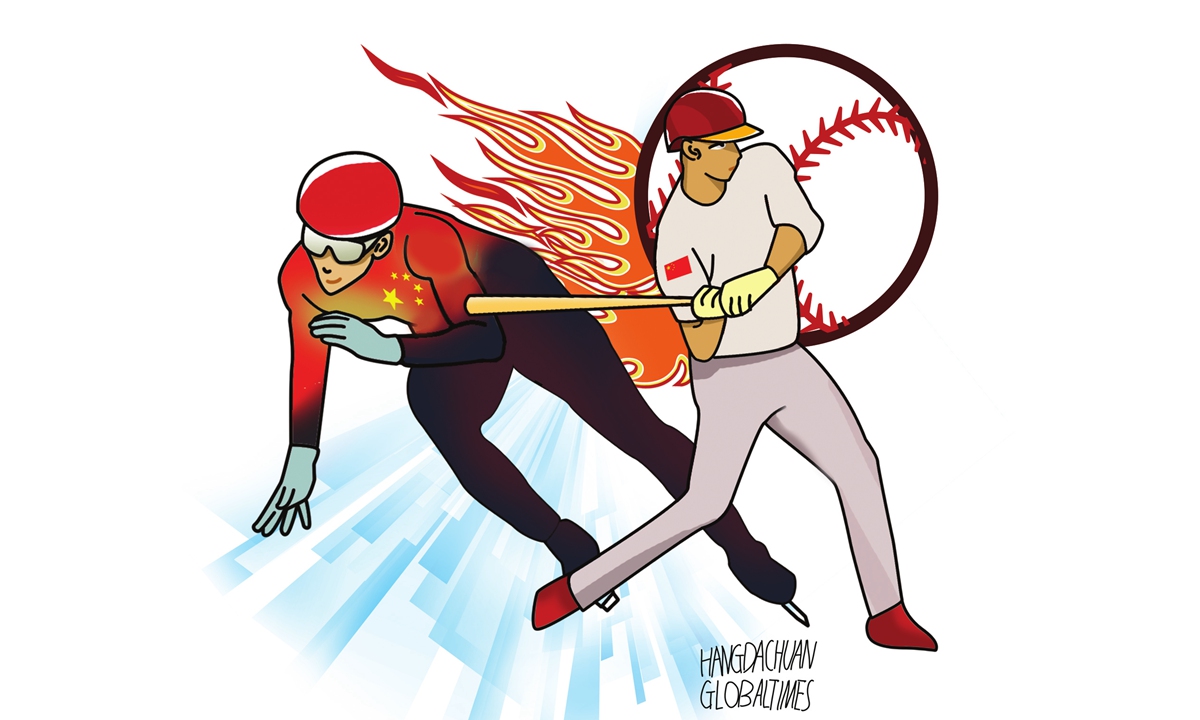SPORT / MISCELLANY
Foreign-born athletes good for enhancing competitiveness

Illustration: Hang Dachuan/Global Times
The World Baseball Classic (WBC) is set to culminate Wednesday morning with the US going up against Japan.The success of China's East Asian neighbors stands in contrast to the Chinese national team in this sport, which suffered four consecutive defeats in the group stage. But what has surprised Chinese fans the most is that four foreign-born athletes were competing for China - US infielder Ray Chang and pitcher Alan Carter, South Korean pitcher Ju Kwon and Japanese outfielder Yusuke Masago - all of whom are ethnic Chinese.
While it is Asia's No.4 team, China, sitting at 30th place in the world, has a massive gap between it and the Japan, Chinese Taipei and South Korea teams, who rank among the world's top four teams beside world No.3 the US.
In many other sports, if a Chinese national team included several non-Chinese speaking athletes, the team would likely face scrutiny, as was the case for the national soccer team when it featured a handful of Brazil-born athletes.
But it seems that in a sport that Chinese national team has yet to see solid international achievements, the inclusion of foreign players is somehow more appreciated.
The Chinese mainland's baseball progress was mainly Olympics-driven after the 2008 Olympic Games in Beijing. But, since it was not a competitive sport at the Olympic Games in 2012 and 2016 and won't be again in 2024, it has not received the same funding that other sports have enjoyed.
Unlike many other sports in which joining the national team requires changing one's nationality or becoming a permanent resident, in baseball, participants have the option to play for the country of their grandparents, which makes the four aforementioned foreign athletes eligible to represent China at the WBC.
Though these four athletes are not among the world leading athletes in baseball, their presence at the WBC have boosted the performances of the team, whose domestic members haven't joined any international games for three years due to the pandemic.
Elsewhere, naturalized short track speed skater Lin Xiaojun, formerly known as Lim Hyo-jun, has led the Chinese short track team to win a gold medal in the men's 5,000 meters relay and a silver medal in the 2,000 meters mixed relay.
The South Korean-born short tracker, previously considered a poster boy for South Korea as he bagged an Olympic gold and a bronze medal at the 2018 Winter Olympics, switched citizenship after not being able to continue his career in South Korea due to now-overturned sexual harassment charges.
Lin's activeness on social media has won him a lot of praise as some domestic media outlets have labeled him as one of China's most popular athletes. He deserves the spotlight as his performance remains top notch.
Lin is not the only short track skater to switch nationalities to represent China.
Hungarian duo Liu Shaolin and Liu Shaoang, who were the members of the Hungarian team that won gold in the 5,000 meters relay at the 2018 Olympics and the 2,000 meters mixed relay at the 2022 Olympics, have become naturalized Chinese citizens.
Changing nationality for competitions is nothing new in sports. In soccer, even FIFA World Cup winners have had squads featuring naturalized players, such as Argentina-born Mauro Camoranesi, who played for 2006 winners Italy.
Recently, Italy has naturalized another Argentine player Mateo Retegui - who does not speak Italian - in a bid to revive Italy's glory after missing out on two World Cups in a row.
With China becoming a sports powerhouse both for summer and winter sports, more athletes from overseas will look to the country.
It is likely that future Chinese teams may feature other players born outside of China, but their presence will for sure improve the quality of Chinese sports.

